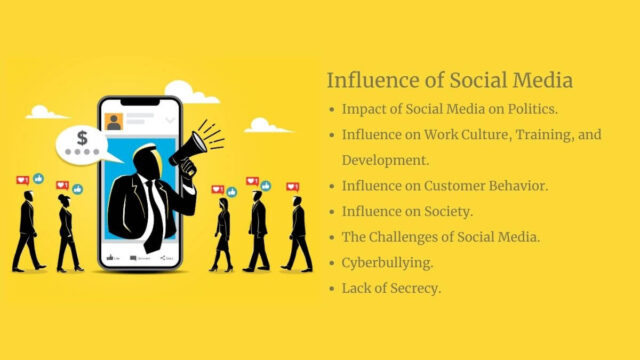How Social Media Influences Political Opinions
Social media has become a significant force in shaping political opinions globally. Its influence has been profound, transforming how political information is disseminated and consumed. The power of social media to influence political opinions will be examined, highlighting its various mechanisms and implications.
The Reach and Accessibility of Social Media
Social media platforms, such as Facebook, Twitter, and Instagram, have provided unprecedented access to information. Political content is continuously shared and reshared, making it available to a broad audience. This extensive reach has ensured that political messages, regardless of their source, can quickly go viral. As a result, individuals who might not actively seek political information are still exposed to it through their social media feeds. The accessibility of social media has thus democratized the dissemination of political content, allowing more voices to be heard.
The Role of Algorithms
Algorithms used by social media platforms play a crucial role in shaping political opinions. These algorithms are designed to maximize user engagement by prioritizing content that is likely to be liked, shared, or commented on. Consequently, political content that elicits strong emotional reactions is often promoted, leading to the amplification of extreme or sensational viewpoints. This selective exposure reinforces existing beliefs and polarizes public opinion. The echo chamber effect, where individuals are exposed only to information that aligns with their pre-existing views, is intensified by these algorithms.
The Spread of Misinformation
Misinformation and fake news are rampant on social media. The ease with which false information can be created and shared has posed significant challenges to the integrity of political discourse. Misinformation campaigns, often orchestrated by malicious actors, have been used to manipulate public opinion and influence electoral outcomes. The rapid spread of false information is facilitated by the viral nature of social media, where sensational and misleading content often garners more attention than factual reporting. The difficulty of verifying the accuracy of information on social media has contributed to the spread of misinformation.
The Influence of Social Networks
Social networks play a pivotal role in shaping political opinions on social media. People tend to trust information shared by their friends and family more than information from official sources. This trust in personal networks has led to the phenomenon of social endorsement, where political opinions are influenced by the endorsements of one’s social circle. When political content is shared by trusted individuals, it is more likely to be accepted and internalized. The reinforcement of political beliefs through social networks has contributed to the formation of tightly-knit ideological communities.
The Impact of Influencers and Celebrities
Influencers and celebrities have a significant impact on political opinions through their social media platforms. Their large followings and perceived authenticity give them the power to sway public opinion. Political endorsements by influencers and celebrities can mobilize support for specific causes or candidates. Their ability to reach and engage a broad audience has made them valuable assets in political campaigns. The influence of these figures on political opinions underscores the role of social media in amplifying the voices of non-traditional political actors.
The Role of Social Media in Political Mobilization
Social media has been instrumental in political mobilization. The organization of protests, rallies, and political campaigns has been facilitated by the connectivity offered by social media platforms. The ability to quickly disseminate information and coordinate actions has empowered grassroots movements and increased political participation. Social media has provided a platform for marginalized groups to voice their concerns and advocate for change. The role of social media in political mobilization has demonstrated its potential as a tool for both empowerment and disruption.
The Effect on Political Discourse
The nature of political discourse on social media differs significantly from traditional media. The brevity and informality of social media communication have led to a more polarized and fragmented political environment. Complex political issues are often reduced to simplistic and emotionally charged messages, hindering constructive debate. The anonymity provided by social media can also lead to uncivil behavior and the proliferation of hate speech. The effect of social media on political discourse has raised concerns about the quality of democratic deliberation.
The Role of Social Media in Electoral Processes
Social media has played a critical role in recent electoral processes. Political campaigns have increasingly relied on social media to reach voters, share their platforms, and counter their opponents. The micro-targeting of voters through social media advertising has allowed campaigns to tailor their messages to specific demographics. However, the use of social media in elections has also raised issues of transparency and accountability. The influence of social media on electoral processes has necessitated new regulations and oversight to ensure fair and free elections.
The Implications for Democracy
The influence of social media on political opinions has significant implications for democracy. On one hand, social media has the potential to enhance democratic participation by providing a platform for diverse voices and facilitating political engagement. On the other hand, the spread of misinformation, the polarization of public opinion, and the erosion of civil discourse pose challenges to democratic governance. The impact of social media on democracy is a double-edged sword, with both positive and negative consequences.
Conclusion
In conclusion, the influence of social media on political opinions is profound and multifaceted. The reach and accessibility of social media, the role of algorithms, the spread of misinformation, the impact of social networks, the influence of influencers and celebrities, the role in political mobilization, the effect on political discourse, the role in electoral processes, and the implications for democracy are all critical factors in understanding this phenomenon. The power of social media to shape political opinions cannot be underestimated, and its influence will continue to evolve with the changing landscape of digital communication.










